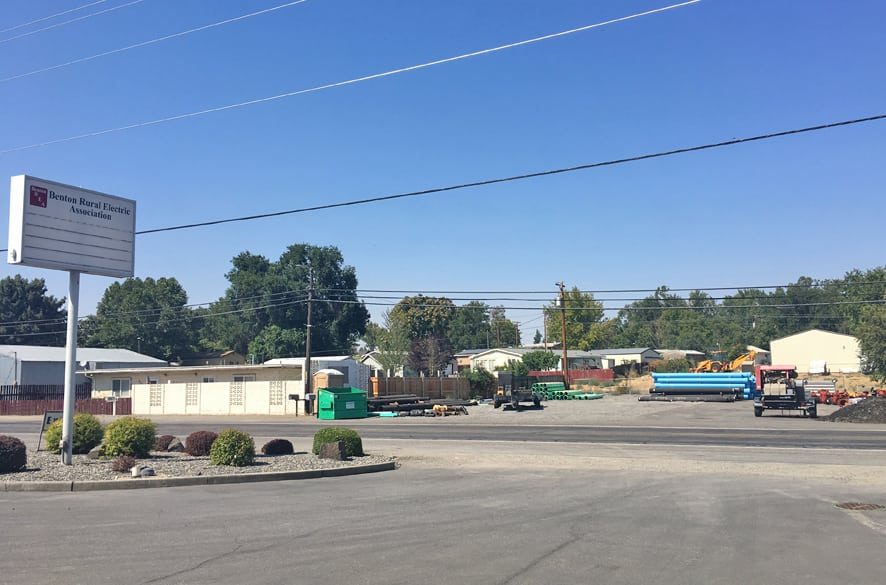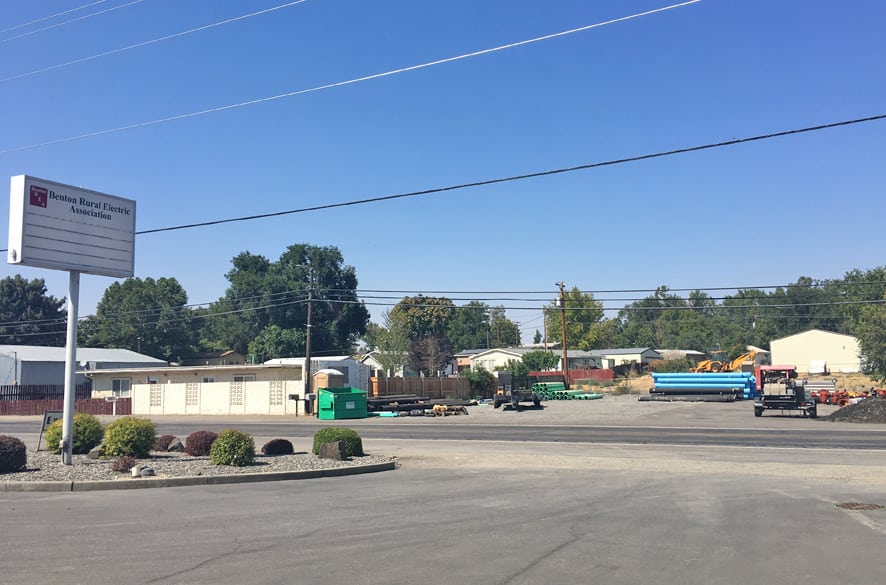
Home » Benton REA’s new co-op solar program sells out in one week
Benton REA’s new co-op solar program sells out in one week

September 13, 2018
Members of the Benton Rural Electric Association bought out a new solar co-op program in just a week, despite declining incentives for the renewable energy source.
Troy Berglund, community development and member relations manager at Benton REA, said he did not know how the program would be received.
“I was uncertain of what to expect, because before the incentive was really high and really popular,” he said.
Previously, Benton REA members who could afford to install rooftop solar panels received state and federal incentives to do so, but because Benton REA is a nonprofit, the association cannot use the federal tax credit for the co-op solar project. Individual members can claim the federal tax credit on their individual returns, however. The state solar incentives have slightly declined in value in recent years. The payback on the latest co-op solar project is about 14-and-a-half years instead of 10 years previously.
“I was unsure of how popular it would be,” Berglund said. “It sold out in a week, so that answered that question.”
The first rooftop solar incentive program, which 173 members participated in, was so popular that the association ate up almost all of its state incentives at that time.
“Benton REA is one of the quickest utilities to run through our incentives than any other utility in the state,” Berglund said, besides Orcas Power and Light Cooperative on Orcas Island.
The solar co-op program is a 25-year program, and Benton REA, which covers a lot of Benton County, including West Richland, Prosser, and Sunnyside in Yakima County, anticipates the project producing just over 30 kilowatt hours of energy through 550 solar units. State law mandates that at least 10 people participate in each project, so the REA set the project cap at that limit. There are 31 participants in the co-op. Each solar unit cost $200 each up front for members, and they could buy up to 55 units.
 “It’s going to take—between the state incentive and the cost savings on their bill—14-and-a-half years to make the $200 back and then after that from 14-and-a-half years to year 25, which is the life of the program, it’s all additional profit,” Berglund said.
“It’s going to take—between the state incentive and the cost savings on their bill—14-and-a-half years to make the $200 back and then after that from 14-and-a-half years to year 25, which is the life of the program, it’s all additional profit,” Berglund said.
Ken and Kirsten McCullough, who have been Benton REA members since they moved to West Richland 18 years ago, were excited to participate.
“Benton REA put it out in their newsletter, and we all jumped on it like June bugs,” Kirsten said.
Kirsten, who used to work at the Hanford area, was grateful to invest in renewable energy, and the couple appreciated the affordability of the co-op program instead of the higher costs of installing and maintaining rooftop solar panels.
“I will just be happy to get some kilowatt reduction, and we figure over a long period of time it will be worth our investment,” she said.
Benton REA Solar Co-op members do not have to worry about maintenance or upkeep for their solar panels. The solar co-op project will be built on Van Giesen Street across from the REA’s West Richland office. Berglund expects the permits for the project to be approved this fall, and construction to begin soon after. The solar array is expected to be operating by spring 2019.
The $200-per-panel cost covers construction and maintenance of the project for its 25-year lifespan, Berglund said. The total project will cost $110,000. Members who did not get to buy panels can still apply and get put on a wait list should members who bought the panels have to move or give up their investment.
Ninety-eight percent of Benton REA’s power is carbon-free, Berglund said, which means the utility has done a lot to be environmentally conscious of carbon emissions. Utility companies and providers are beginning to look to the transportation sector to help, however.
“The biggest carbon emitter in the state is the transportation sector, so if there are things we can do with incentives, for example, with electric vehicles that has a big impact on carbon reduction,” Berglund said.
Jim Jewell understands this idea well. He owns two electric cars and an electric motorcycle. After waiting two years, his Tesla Model 3 finally came late this August. The inside of Tesla’s latest car looks sleek and futuristic, giving off spaceship vibes with one distinction: there are hardly any buttons. Instead, what looks like a laptop screen protrudes from the front console between the driver and passenger seats. This is the control pad for everything from directions to air to music.
Jewell, who has worked for utility companies in the past, said he loves the feel of electric cars. He charges his Nissan Leaf and Tesla at home on chargers every night. This practice has increased his utilities bill, however, so when Jewell found out about the solar co-op, he was all in.
He was the first in line to get into the program, waiting in the parking lot by 7:15 a.m. he said, despite the REA not opening until 8 a.m. He bought as many panels as he was allowed to under state law. He estimates his solar panels could produce a third or half of his power once they are up and running.
“Over the next several years, it eventually pays for itself,” he said. “It’s doing the right thing for the environment. It’s important, if we all do everything we can, it might make a difference.”
Jewell’s Tesla can make it over the mountains on one charge, and range anxiety that he had with his Leaf (which is older and has a range of about 70 miles, Jewell said) has dissipated. Benton REA and other utilities in the area are working together to set up charging stations throughout the region. Berglund said Benton REA is installing an electric car charger in Prosser, and Benton PUD has installed one in Kennewick (See story on page 36). Jewell sees electric cars as an investment in Washington state, when it comes to transportation since the state has no oil wells.
“Every dollar you spend on gasoline or even gas-fired power plants or coal-fired power plants is dollars you’ve exported out of your state,” he said. “Every time you use solar and wind that the utility provided or you provided yourself, those are dollars that stay in Washington state for Washington state businesses and for the rest of us, and it’s like wow, what a win that is.”
For Benton REA members, who had to pay up front for their solar panels, it was less about the money and more about investing in renewable energy sources. For the McCulloughs, investing in solar is also about doing what they can to prevent climate change.
“It supports a lot of things that can get done without destroying the rest of the earth,” Kirsten McCullough said.
The McCulloughs and Jewell hope that Benton REA will propose more solar projects in the future.
“I can get license plates that say solar-powered, and it will literally be true,” Jewell said.
Whether or not Benton REA is able to do a second phase of the solar co-op program could be a matter of running out of incentives—again.
“The problem is (again) that we’re the victim of our own success. We already almost gobbled up all the inventive for the new program,” Berglund said.
The association is not accepting applications for rooftop solar panels currently to make sure they have enough incentives to cover the co-op.
“In a way that’s a good problem to have,” he continued. “It’s exciting that it’s a program that our members are excited about.”
Local News Science & Technology
KEYWORDS september 2018



